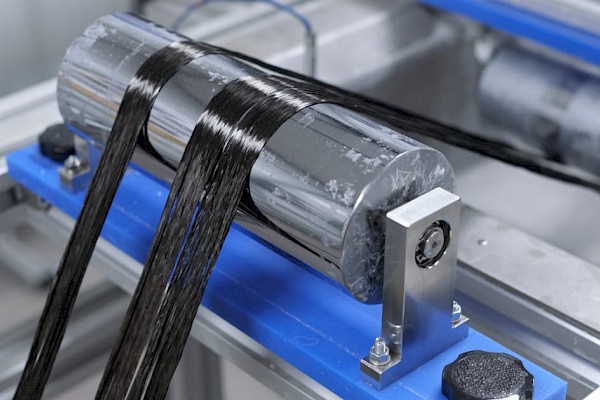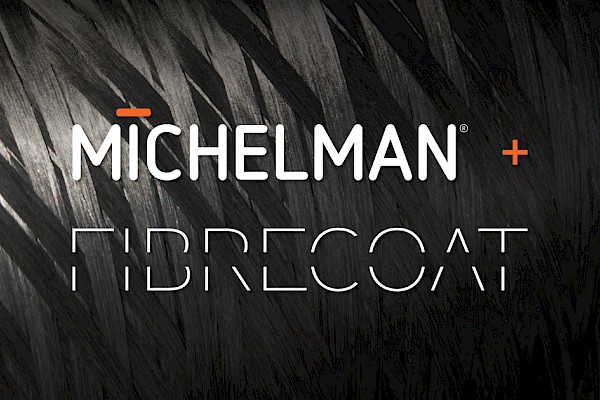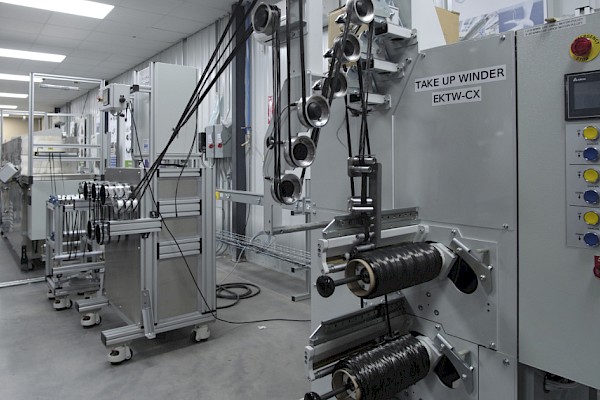The Right Fiber Sizing is an Advantage No One Can Afford to Ignore.
Composites are quickly changing the way we drive, transport goods, generate energy, and more commonly, how industry handles problems that involve a maximum strength/minimal weight contradiction. The role sizing plays in the manufacture of composites is critical and complex. Our Hydrosize® family of products consists of sizing solutions that are specifically developed for use in the manufacturing of natural, carbon, and glass fibers, including chopped and continuous formats.
Sizing and Its Importance
“Sizing” is a thin, homogenous coating applied to the surface of fibers during the manufacturing process. Not only does it protect the fiber during its production, but also during post-processing operations such as handling, spreading, weaving, compounding, and moulding. Additionally, it helps in processing fiber into intermediary forms such as fabrics, braids, thermoset prepreg, and thermoplastic organo sheets.
Sizing Formulation
Fiber producers create their own, unique sizing formulations to deliver the best performance attributes to the fiber. These formulations are composed of water, silane coupling agents (specifically for glass and basalt fiber), film formers in dissolved, emulsified, or dispersed form, and a range of additives or modifiers such as surfactants, plasticizers, anti-static agents, antifoams, and rheology modifiers. These ingredients are carefully mixed together and delivered to the fiber to perfectly match the requirements of the targeted applications. Michelman has developed a range of lubricants, binders, and film formers exclusively formulated for the fiber manufacturing process that deal with the unique challenges faced by the industry.
The Film Former
When it comes to the manufacturing and further processing of fiber, the film former plays an important role in both the fiber’s physical characteristics and finished composite properties. It provides improved adhesion and facilitates effective load transfer between the fiber and the matrix polymer, while imparting mechanical properties such as tensile strength, fatigue resistance, and impact resistance. Hundreds of film former dispersions are commercially available, but only a small percentage of them are compatible with other sizing ingredients. Michelman’s technology allows customers to tailor the surface chemistry of reinforcement fibers to the chemistry of the matrix resin, thereby optimizing the interfacial adhesion between the polymers and fibers.
Sizing Stability
Stability is one of the key characteristics that fiber manufacturers take into consideration when selecting raw materials for their sizing formulations. There are 4 major effects of sizing variation on fiber production:
Sizing Problem | Effect on Fiber |
Particle Size | Changes in Loss on Ignition (LOI) |
| Short shelf-life | Increase in manufacturing downtime |
| pH changes | Gain or loss of sizing pick-up on fiber |
| Foam | Fuzz, changes in LOI, uneven coverage |
Sizing Benefits
Sizing benefits composite performance by optimizing the fiber-polymer interfacial adhesion. Not only does it protect the freshly formed fiber surface from abrasion, prevent fiber breakage at contact points, and preserve chopped bundles of fiber; sizing enhances the performance of a number of mechanical and chemical properties:
Mechanical Properties
- Impact resistance
- Tensile strength
- Flexural strength
- Compressive strength
- Fatigue resistance
Chemical Properties
- Thermal & color stability
- Hydrolytic stability
- Corrosion resistance
- Odor profile
- Dispersion
Processing Benefits
Sizing optimizes the processability of fiber. Although sizing is a small percentage of fiber reinforced composites— normally 0.5 - 5% of its weight— it affects the production and the processing of the fiber, and has a significant impact on the interface properties between the fiber surface and the composite matrix.
- Integrity: Keeps the chopped bundles together
- Chopping: Increases the chopper's blade life and reduces fuzz generation
- Unwinding: Keeps the strand together
- Weaving: Provides lubricity and flexibility to prevent breaks
The Interface
The sizing is the “glue” when sized fiber is introduced to the resin matrix. The forces between sizing and matrix can be chemical bonding, hydrogen bonding, and Van der Waals interaction. Michelman takes a chemistry-agnostic approach to solving interface adhesion problems, creating custom solutions that are optimized for the myriad combinations of polymers, the fibers & fillers to which they are applied, and the various manufacturing processes used to produce composites.
Product Name | Form Type | Product Solids Type | chopped strands | PA compatible | PC compatible | thermal stability | PET/PBT compatible | PP compatible | PPS/ETP compatible | thermosets compatible | block resistance | continuous fiber | impact resistance | slip and lubricity | hydrolysis resistance |
|---|---|---|---|---|---|---|---|---|---|---|---|---|---|---|---|
| Hydrosize® HP-1632 | Solution | Polyimide | • | • | • | • | • | ||||||||
| Hydrosize® HP3-02 | Emulsion | Phenoxy Dispersion | • | • | • | • | • | • | • | ||||||
| Hydrosize® PA845 | Dispersion | Polyamide | • | ||||||||||||
| Hydrosize® PA845H | Dispersion | Polyamide | • | • | • | ||||||||||
| Hydrosize® PP2-01 | Dispersion | Polypropylene | • | • | • | • | • | • | |||||||
| Hydrosize® PP270 | Emulsion | Polypropylene | • | • | |||||||||||
| Hydrosize® PP943 | Emulsion | Polypropylene | • | • | |||||||||||
| Hydrosize® U1-03 | Dispersion | Modified Polyurethane | • | • | • | • | |||||||||
| Hydrosize® U2022 | Dispersion | Polyurethane | • | • | • | • | • | ||||||||
| Hydrosize® U2023 | Specialty Dispersion | Polyurethane | • | • | • | • | • | ||||||||
| Hydrosize® U5-02 | Dispersion | Polyurethane | • | • | • | • | • | • | |||||||
| Hydrosize® U6-01 | Solution | Polyurethane | • | • | • | • | • | ||||||||
| Hydrosize® U7-01 | Dispersion | Polyurethane | • | • | • | • | • |

News (Wednesday, 12 February 2025)
Fiber Sizing Line Kicks Off Open House at Innovation South
The 70-ft line consists of equipment contributed by Michelman and enables hands-on training for composite engineers.

News (Tuesday, 21 January 2025)
Hydrosize® Aids Creation of Lightweight, Conductive Fiber
Collaboration with FibreCoat leads to basalt fiber for EMI, RFI shielding, and thermal management applications.

News (Tuesday, 7 May 2024)
Michelman promotes fiber sizing innovation by partnering with IACMI.
IACMI is helping businesses accelerate the pace of product commercialization with Michelman’s state-of-the-art fiber sizing line.